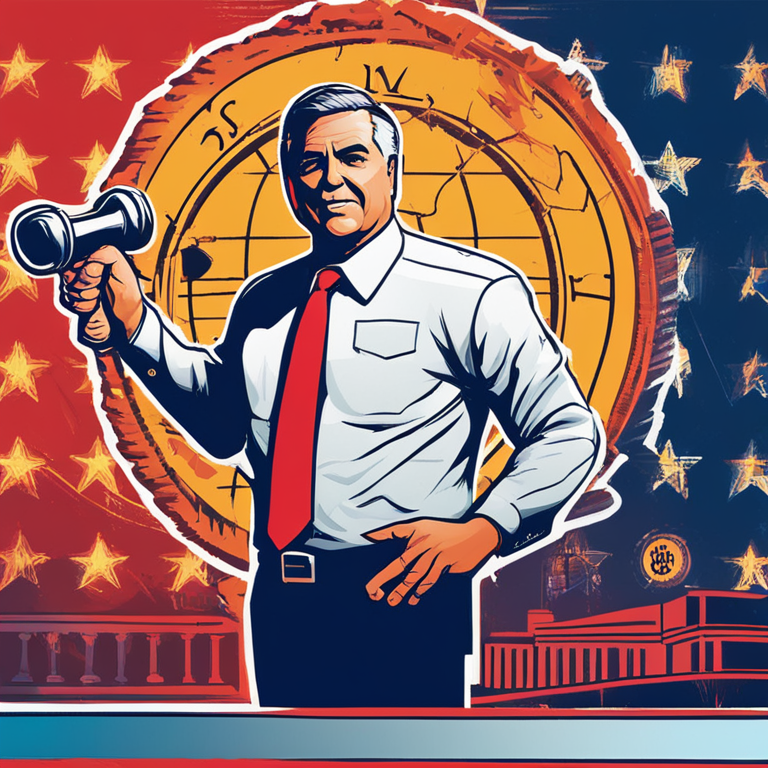Capitol Hill Clash: Congressman Emmer Takes on SEC Chief Gensler Over Investor Protections
- byAdmin
- 08 May, 2024
- 20 Mins

Capitol Hill Clash: Congressman Emmer Takes on SEC Chief Gensler Over Investor Protections
In a fiery exchange that's catching the eyes of Wall Street and Main Street alike, Congressman Tom Emmer has openly criticized SEC Chairman Gary Gensler, accusing him of overstepping regulatory bounds with the introduction of SAB 121. This bold move underlines a growing tension between the need for investor protections and the cry for regulatory restraint, shaking the very foundations of the Securities and Exchange Commission's mission. From legislator's lips to the investor's ears, this story is unraveling amidst fears of an unprecedented regulatory reach that could redefine the landscape of financial oversight.
Capitol Face-Off: Emmer Vs. Gensler in a Regulatory Rumble Over SAB 121
In a political showdown that feels more like a heavy-weight championship than a regulatory dispute, Congressman Tom Emmer has thrown a proverbial punch at SEC Chairman Gary Gensler. The bone of contention? A seemingly arcane document known as Staff Accounting Bulletin (SAB) 121. Tensions are at an all-time high, as Emmer accuses Gensler of regulatory overreach, claiming that the new rule could stifle investor freedoms and hinder capital formation. At stake is not just the future of financial regulation, but the very principles that the SEC was founded upon: investor protection, capital formation, and the maintenance of fair, orderly, and efficient markets. The air is thick with anticipation as Wall Street and Main Street alike wait with bated breath to see how this tussle will unfold, making everyone wonder—will this clash lead to a setback or a step forward in financial oversight?
In the midst of this regulatory tug-of-war, Congressman Emmer's critique is sharp and succinct: "The SEC's primary mission is to protect investors and ensure the health of our capital markets. SAB 121 runs counter to these goals," asserts Emmer. On the flip side, Gensler stands firm, defending the guideline as a necessary step for enhancing transparency and reducing risks for investors in the ever-evolving financial landscape. These exchanges have sparked a flurry of commentary from financial experts, lawmakers, and industry insiders, each voicing their stance on a spectrum ranging from staunch support to vehement opposition. The drama is palpable, as the debate over SAB 121 rages on, symbolizing a broader discussion about the balance between regulation and innovation.
The controversy surrounding SAB 121 is not an isolated phenomenon. It's the latest chapter in a long-standing debate over the role of government in the financial markets—a saga of power plays, ideological clashes, and the quest for a balanced regulatory framework that safeguards the economy while fostering growth. Historical context reveals that such disputes are cyclical, reflecting the ever-changing dynamics between market freedom and regulatory control. As the financial sector continues to evolve, with cryptocurrencies and other digital assets entering the fray, the SEC finds itself at the crossroads of tradition and innovation. This clash with Congressman Emmer underscores the complexities of governing such a diverse and rapidly changing financial landscape, making it a watershed moment for regulatory policy in the United States.
Additional Information

In a financial ecosystem that's rapidly evolving with the advent of digital currencies and blockchain technology, the stakes are higher than ever. Regulatory bodies like the Securities and Exchange Commission (SEC) are in the tough spot of adapting to these changes while ensuring investor protection and market integrity. The heart of the pivot is Staff Accounting Bulletin (SAB) 121, a document that might seem mundane but carries significant implications for the future of financial regulation. The friction between Congressman Tom Emmer and SEC Chairman Gary Gensler over this bulletin illuminates deeper questions about the balance between fostering innovation and maintaining regulatory oversight. As cryptocurrencies and blockchain-based investments gain mainstream traction, the resolution of this conflict could chart the course for how future financial innovations are governed in the United States and beyond.
Conclusion
At its core, the clash between Congressman Emmer and SEC Chairman Gensler over SAB 121 is more than a skirmish over policy specifics—it's a battle for the soul of America's financial markets. It brings to the fore fundamental questions about the role of government in regulating new and evolving marketplaces, without stifling innovation or exposing investors to undue risk. While Emmer criticizes the SEC's approach as potentially overreaching, Gensler defends it as necessary for investor protection in a changing world. This debate is not just a matter of legal semantics; it's about finding a pathway that supports growth and innovation while safeguarding the principles of fairness, transparency, and security that the markets were built upon. As the dust settles on this confrontation, its outcomes could redefine regulatory approaches in the age of digital finance, making it a defining moment with long-reaching consequences for regulators, investors, and innovators alike. Injecting humor, one might summon an image of Uncle Sam trying to ride a blockchain-powered bull—exciting, perilous, and an adventure emblematic of the American spirit of innovation and determination. The question remains: Will this rodeo lead to a safer pasture for all, or are we in for a wilder ride into uncharted territories?
Ethan Taylor
Ethan Taylor here, your trusted Financial Analyst at NexTokenNews. With over a decade of experience in the financial markets and a keen focus on cryptocurrency, I'm here to bring clarity to the complex dynamics of crypto investments.



